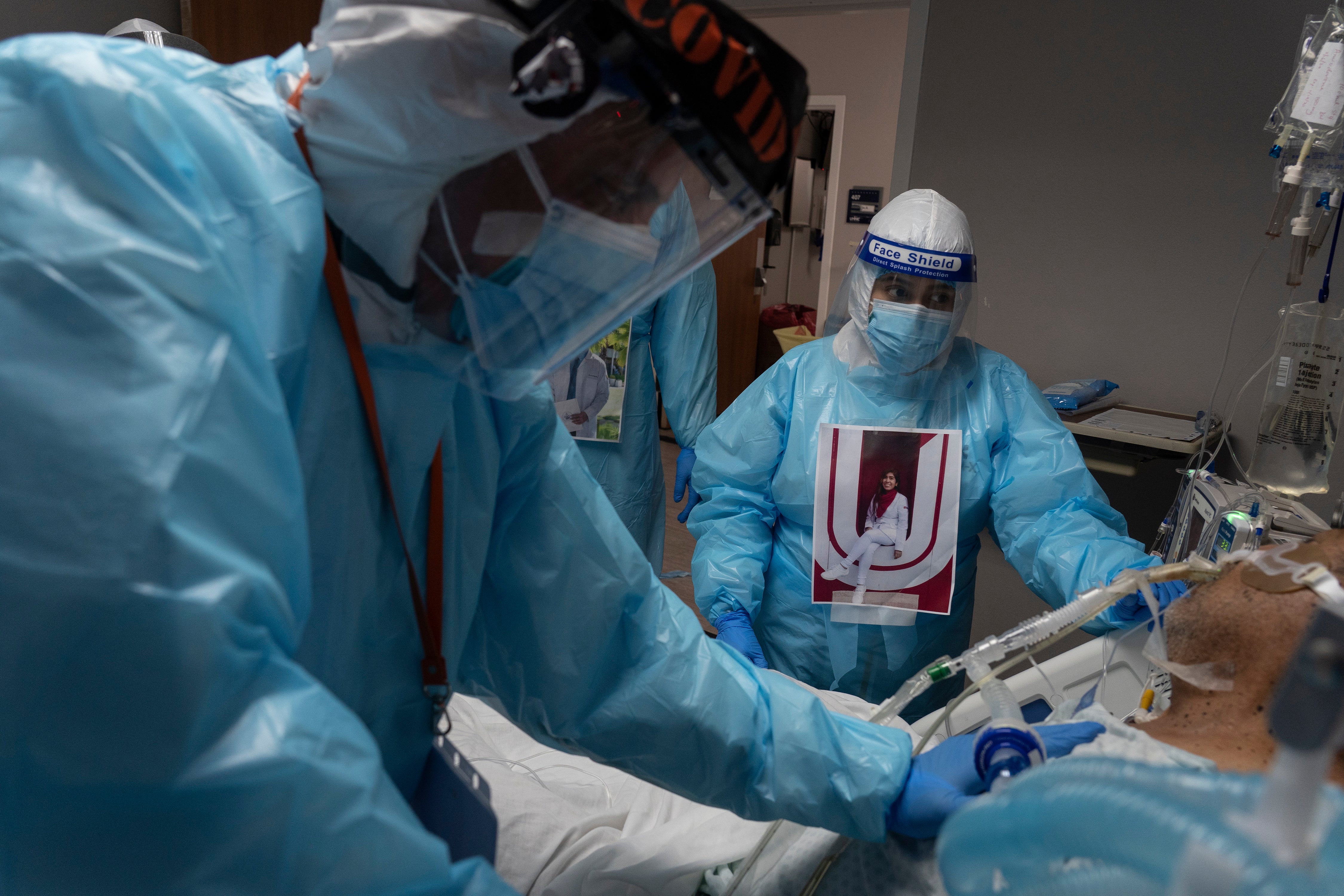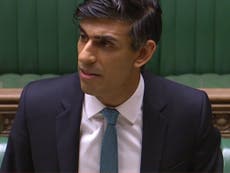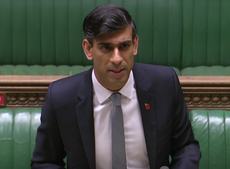Rishi Sunak earmarks £55 billion to help fight coronavirus and pay for vaccines
Treasury sets out plan to spend billions fighting virus and investing in NHS but social care gets just £300 million from Treasury

Your support helps us to tell the story
From reproductive rights to climate change to Big Tech, The Independent is on the ground when the story is developing. Whether it's investigating the financials of Elon Musk's pro-Trump PAC or producing our latest documentary, 'The A Word', which shines a light on the American women fighting for reproductive rights, we know how important it is to parse out the facts from the messaging.
At such a critical moment in US history, we need reporters on the ground. Your donation allows us to keep sending journalists to speak to both sides of the story.
The Independent is trusted by Americans across the entire political spectrum. And unlike many other quality news outlets, we choose not to lock Americans out of our reporting and analysis with paywalls. We believe quality journalism should be available to everyone, paid for by those who can afford it.
Your support makes all the difference.A £55 billion fighting fund has been set aside by the Treasury to help the UK fight the coronavirus pandemic including £6 billion to pay for new vaccines.
As part of the spending review unveiled by Chancellor Rishi Sunak on Wednesday the Treasury confirmed the government will spend an extra £38 billion in 2020-21 including £2.6 billion for the devolved nations on tackling the effects of the virus.
This includes £6 billion to pay for and research vaccines. The UK has already purchased 100 million doses of the Oxford University vaccine as well as 40 million of the Pfizer vaccine and 5 million doses of the Moderna vaccine.
All three have successfully passed their clinical trials and could be approved for use within weeks.
The UK vaccines taskforce, which was set up in April, will get £733 million in 2021-22 to purchase vaccines and £128 million to fund research and development of new inoculations and manufacturing to ensure the UK can get enough doses.
The test and trace service, led by Baroness Dido Harding, will have £15 billion in 2021-22, bringing its total funding to £22 billion, to deliver regular testing of NHS and social care staff but the Treasury said the funding would be kept under review depending on how the virus develops.
A total of £163 million will be spent on increased supplies of key medicines needed by doctors to treat Covid-19 patients.
The coronavirus funds also include a £21 billion of spending that has yet to be allocated but will be earmarked as a contingency fund ready to be spent where needed in 2021.
There will also be £2.1 billion spent on protective equipment for doctors and nurses and to maintain at least a four months supply of PPE.
In terms of overall spending on the NHS, the Chancellor re-committed the government to the long-term plan for the NHS, agreed in 2018, to give the NHS a cash boost of £33 billion by 2023-24.
In addition the Chancellor has earmarked £3 billion to help the health service recover from the pandemic, with £1 billion spent to tackle a backlog in operations.
The Treasury said this was “enough funding to enable hospitals to cut long waits for care by carrying out up to one million extra checks, scans and additional operations or other procedures.”
The money also confirms £500 million to address waiting times for mental health services and £325 million for new diagnostic machines such as MRI and CT scanners.
The Treasury said this would be enough to replace over two thirds of imaging equipment that is over a decade old.
Other key health spending includes:
- A pay rise for NHS staff will happen next year but will not be made until independent pay review bodies have reported early next year
- £260 million for Health Education England to expand training of new nurses and doctors
- £2.3 billion investment in capital budgets as part of plans to upgrade 70 hospitals and re-build 40 others by 2030 on top of £4.2 billion for hospitals to refurbish and maintain their existing buildings and equipment
- £559 million to invest in new technology to “modernise” health services
- £165 million for the eradication of mental health dormitories wards which have been criticised by the Care Quality Commission.
On social care the government said it would give local councils access to up to £1 billion of spending through a £300 million social care grant and the ability of councils to add a 3 per cent levy on to council tax. This is on top of £1 billion announced last year.
The Treasury said £3 billion would be made to help councils cope with Covid pressures, adding: “In the longer term, the government is committed to sustainable improvement of the adult social care system and will bring forward proposals next year.”
Caroline Abrahams, charity director at Age UK and co-chair of the Care and Support Alliance said: “The government passed up the opportunity to play fair with social care, instead granting it insufficient extra money to safeguard the current level of services through next year.
“The Spending Review documentation says that the government will bring forward proposals on them longer term reform of care in 2021, but as a result of the decisions announced today social care will be even weaker by then than it is now. It’s hard not to conclude we’ve gone backwards.”
Dame Donna Kinnair, chief executive of Royal College of Nursing added: “While today's investment in the NHS and social care in England is welcome, that money will only truly benefit patients if there are enough nursing staff to treat them.
“The Chancellor was one of millions on doorsteps to clap carers this year. Unlike others, he had the power to turn warm words into deeds – but today, he has failed to act.”
Sally Warren, director of policy at The King’s Fund think tank said the spending review was an attempt to balance the need to invest in health spending alongside the hit the economy had taken that had meant soaring borrowing.
She said: “The planned investment in health and social care is welcome given the wider financial situation. However, it is unlikely to be enough to address the pressures faced by services across the country, which are likely to require more emergency funding next year.
“The lack of funding for a multi-year health and care workforce strategy is disappointing and will make it difficult for the government to fulfil their manifesto commitments, such as the promised 50,000 extra nurses. This will only add to the uncertainty and pressure faced by health and care services.”




Join our commenting forum
Join thought-provoking conversations, follow other Independent readers and see their replies
Comments